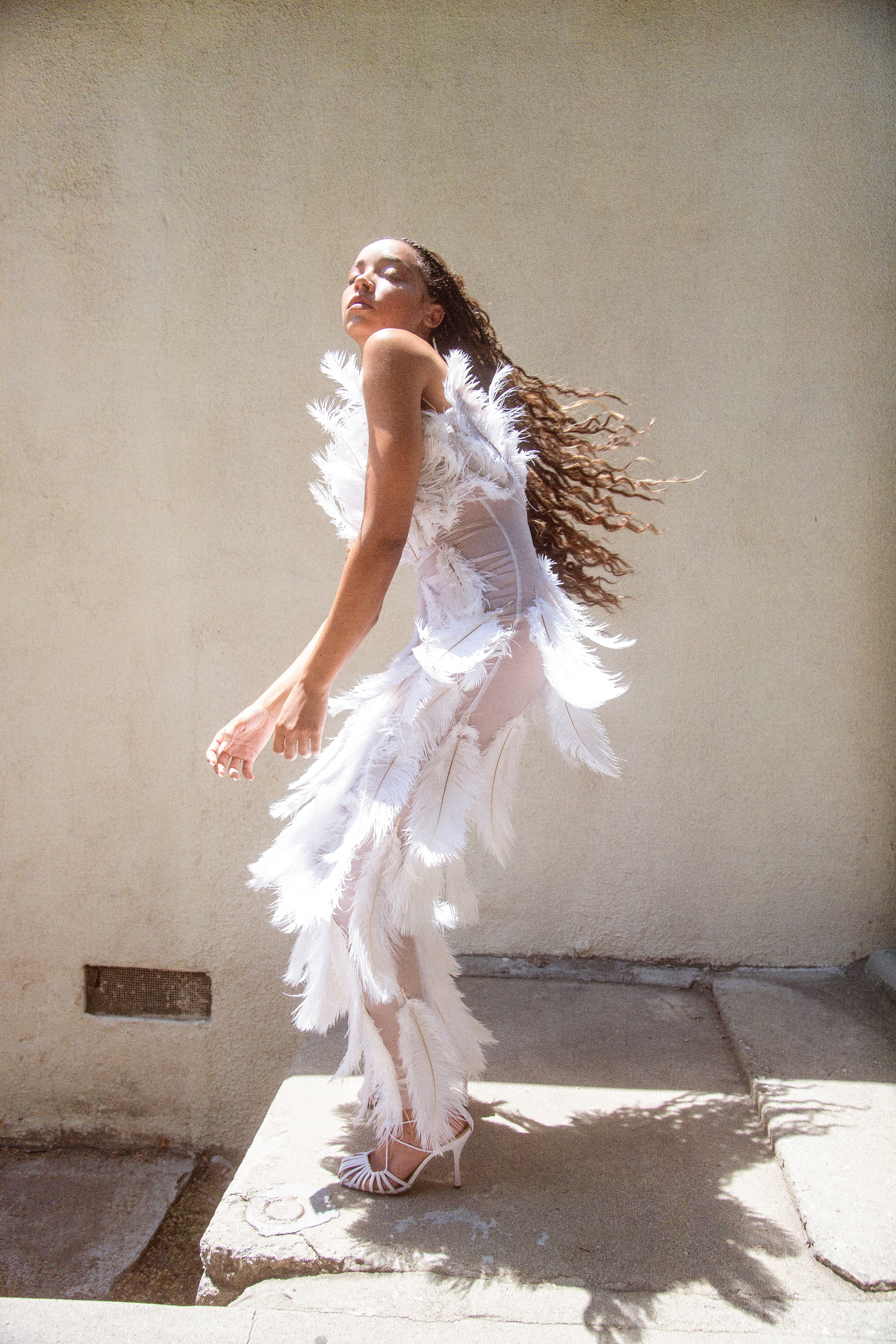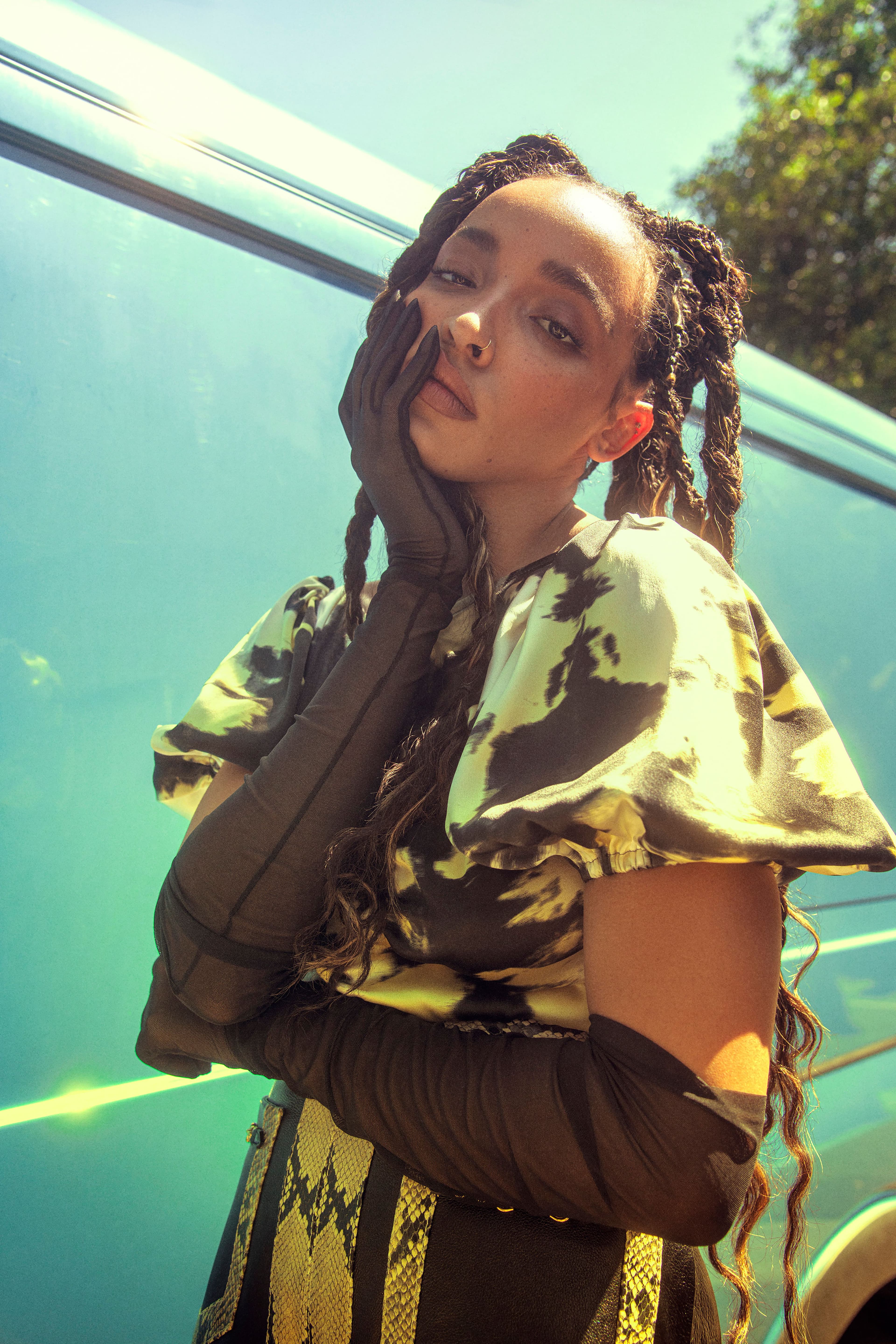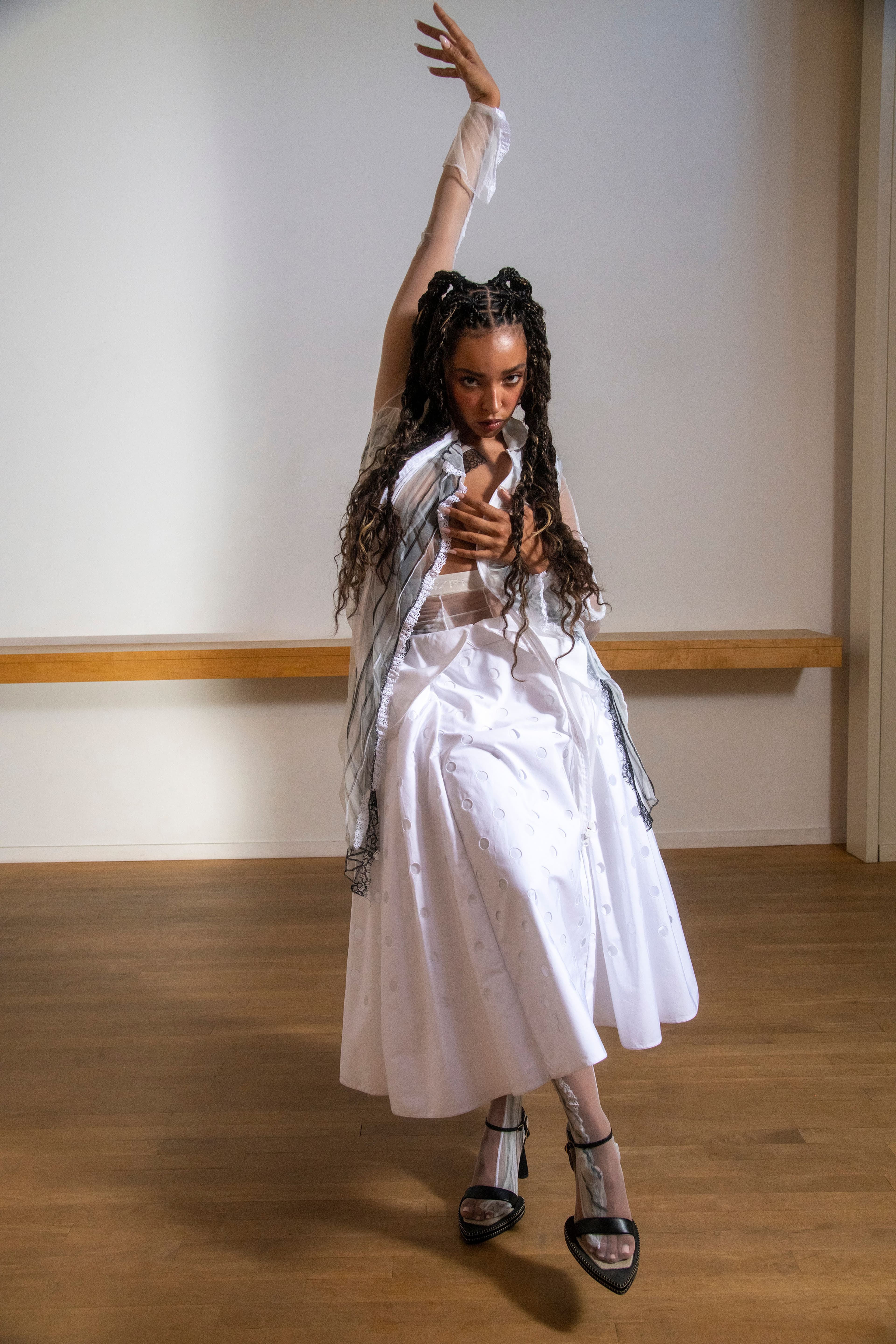
Dress by Tia Adeloa. Shoes by Chelsea Paris.
Tinashe Makes Her Own Way
Every generation has its artists whose music mirrors the times. In the Seventies and Eighties, it was the flamboyant Sylvester James Jr., known mononymously as Sylvester and colloquially as the “Queen of Disco.“ Though Sylvester’s musical journey—like that of many Black musicians of that era—began in the Black church singing gospel standards, he would later leave the church and find family within a group of gender-expansive folks who called themselves the Disquotays. As the HIV/AIDS epidemic ravaged queer, Black, and trans communities, Sylvester’s music was a savior for so many who would visit discotheques and observe as the dancefloors shrank in size as people succumbed to AIDS-related illnesses. During one of the darkest times in American history, songs like “You Make Me Feel (Mighty Real)“ and “Dance (Disco Heat)“ stood as anthems of freedom for those whose hearts, minds, and souls were crushed by a dangerous mixture of public apathy and government neglect.
Four decades later, pop is still a liberating tool, and Tinashe is its reigning champion, making music for finding and freeing ourselves. While traditional protest songs like Marvin Gaye’s “What’s Going On“ or Bob Marley’s “Get Up, Stand Up“ motivated the masses to pay attention to inequity, songs that incite joy have helped so many return to their bodies and find safe haven on dance floors in both public settings and the privacy of their homes. Think Whitney Houston’s “How Will I Know“ or the Spice Girls’s “Spice Up Your Life“ during the era of Girl Power. Pop music transports us and makes us who we are.

Dress by Christian Siriano
In 2019, Tinashe did the then-unthinkable when she departed from mega-label RCA Records after seven years of partnership. In a grand act of refusal, she achieved the goal of so many emerging musicians and rightfully chose to leave in the interest of her artistry. “When I first signed to my label and when I first performed for them, I remember telling the CEO, ’I’m going to do this with or without you guys. So you can be a part of it or not,’“ she recalls. “And that statement has held true. I meant it.“
Any fan of Tinashe knows that her journey as a musician began long before she performed in front of the executives at RCA. Tinashe Jorgensen Kachingwe was born to college professors Michael and Aimie Kachingwe in Lexington, Kentucky, on February 6, 1993. In a 2011 video on Tinashe’s YouTube page titled “Tinashe’s Childhood in 7 Minutes :),“ we see the young artist’s trajectory from a one-year-old singing “Twinkle, Twinkle, Little Star“ to a singer-songwriter at the tender age of seven. (Her first original song, “Deep in the Night,“ appears as an interlude on her début project Aquarius.) As the video progresses, we see all the visual cues of young girlhood, but rather than just playing with puppets or dressing up as a princess, a young Tinashe takes the stage in her own vision of a full-production concert, performing in her family’s home complete with costumes, props, and a broom serving as a mic stand. The video concludes in 2011, with a snippet from an early performance as an opening act for Justin Bieber, after Michael and Aimie moved Tinashe and her younger brothers, Thulani and Kudzai, to Los Angeles. It is this commitment that so many of her fans adore. Tinashe’s success is no coincidence—it is the culmination of her literally lifelong dedication to her craft.

Dress by Christian Siriano. Shoes by Gucci. Earrings by Jacquemus.
After the release of her third album, Nightride, in 2018, Tinashe began work on Songs for You, which became her first independent release. Dropping in November 2019, the album was introduced by the bass-infused single “Die a Little Bit,“ featuring the British rapper Ms Banks. On the track, Tinashe swoons, “Sometimes I can’t, but I’ve been told I need to breathe.“ Later, a sampled voice says, “I’m gonna show you what it’s like to dance/This is probably my favorite part because/You just get to be free.“ The project and single signaled to her fans and the world that it was time for freedom and she would no longer wait for some approval that was never necessary in the first place. In contrast to Nightride, which was rumored to have sat in RCA’s “maybe“ pile during her time at the label, Songs For You was properly championed and thus rose quickly to the number-one spot on the iTunes album chart, while the non-single “Save Room For Us,“ featuring MAKJ, made its own impact, topping the R&B charts.
In February 2020, with the album sustaining momentum, Tinashe announced a nineteen-show spring tour that would kick off in Detroit on April 20. In an interview with Billboard, she said Tour For You was “directly for the people that support me,“ adding, “I create art for this connection. It’s for the fact it means something to people and it’s not about the charts and accolades.“ Like all musicians who had concerts scheduled then, she ended up having to cancel the tour in May 2020. In a post on social media, she wrote to her fans saying, “Unfortunately the Tour For You dates are now cancelled. Considering money is tight at the moment, REFUNDS will be processed at the point of purchase for all tickets <3.“ To keep up with both the demand and her ongoing commitment to her audience, she accepted several invitations for virtual concerts, but her capacity quickly dwindled. “I felt like I couldn’t really get into it as much as I would on a stage,“ she says. “When you’re on stage, you just lose yourself. But in the Zoom shows, it’s more transactional.“

Top by Saint Sintra. Skirt by Jacquemus.
While there has been great creative innovation since the beginning of the Covid-19 pandemic—wherein artists have gone above and beyond to breathe life into their catalogues in virtual rooms—one still has to wonder about the spiritual wear and tear. Even with drone technology and inventive formats, with no audience, the energy is simply not the same. And for an artist like Tinashe, this connection is essential. “It’s hard to really get into“ streaming performances, she explains. “Even after a year of doing them, the virtual performance thing still feels distant from the audience.“
This June, Tinashe re-emerged to announce her latest project, an LP titled 333, along with a much-needed summer anthem. The track, “Pasadena,“ is her second collaboration with fellow California- based talent Buddy, with whom she worked on a track titled “Glitch“ last year. The new song—and accompanying video, which was directed by rising photography star Micaiah Carter—is a luscious ode to California, self-affirmation, care-taking, and the urgency of finding joy. In the first verse, Tinashe sings, “Now more than ever, life is all what you make it“—lyrics that couldn’t ring more true in today’s political climate. As the death tolls continue to rise in the pandemic and so many marginalized people are left with no option but to make their voices heard in response to state-sanctioned violence, Tinashe uses the power of pop music to remind us all that “life is yours for the taking.“ With the levity of the Oliver Malcolm-produced beat, both Tinashe and her counterpart Buddy are encouraging us not to wait—our joy must be found today.

Dress by Tia Adeola. Shoes by Chelsea Paris.
“The main thing that I really wanted to get across with this project was just a sense of joy and hope, and energy of inspiration,“ she adds. “I think that there was a real intention for me to create music that felt joyful and to bring that energy into the universe.“ In her second single, “Bouncin’,“ the same energy comes through in the hard-to-resist bassline. Her signature sound suffuses other tracks on the LP, like the highly anticipated “Let Me Down Slowly,“ which leaked on music blogs this year; “I Can See The Future;“ and my personal favorite, “SHY GUY,“ a drum and bass track about falling in lust. “I want music that feels like energy,“ she explains. “It makes you feel like you need to drive somewhere or go somewhere or see someone or do something.“ In what has been deemed “hot vaxxed summer,“ Tinashe’s 333 is timed absolutely right.
In another track on the album, titled “Unconditional“ and produced by Grammy winner Kaytranada, we hear the voice of the artist’s own father. The sample is from a found cassette tape in which Dr. Kachingwe, a lecturer in the theater department at California Polytechnic University-Pomona, is translating a play and nodding to the idea that we need not glorify war. In the eighteen-second clip, he states, “Not only are the masks shed off, but also the notion that war is romantic, the idea that there are heroes and these heroes are supposed to be idolized and idolized because of what they do in war.“ Elsewhere, there is production by her brothers. So much of Tinashe’s career has been ushered, nurtured, and supported by her tight-knit family. “My family is such a huge part of my life that it almost just feels natural that they would be a part of my art,“ she adds. “The pandemic highlighted how much it meant to me, even more than I obviously already knew.“

All clothing and accessories by Schiaparelli
During our interview, Tinashe explained that the support and anchoring of her family have been critical as she’s mapped an independent path within the music business. “I’m constantly grateful for this connection, because I do think it is really, really unique,“ she says. “It keeps me centered, because this industry is wild.“ With stars rising and dimming in quick succession, it’s important to understand how integral this support is for an artist. “Now I have to motivate myself without being signed to a record label and having that [type of] affirmation,“ she says, to remind herself “that I’m still valid and find softness as the leader of my ship.“
As many folks around the world are relearning when and how to be a part of the world around them, it is this softness—which Tinashe so evocatively describes—that feels most pertinent. Our self-respect must come from within before we can depend on it from any outside source—whether that be an employer or an executive at a record label. In the ebb and flow of her career, Tinashe has been a consistent champion for herself and other musicians who are shooting their shot in an industry that pigeonholes and limits the creative potential of Black artists. In so many ways, she stands as a testament to knowing your own worth and shining, no matter who is watching.
333 is out now. Read this story and many more in print by ordering our Summer 2021 issue here, with $10 from the sale of each issue going to the Equal Justice Initiative, selected by Tinashe.

Top by Ganni. Skirt by Gucci. Gloves by Ushatáva.

Jacket and tights by Y/Project. Dress by Prada. Shoes by Jacquemus.
As a nonprofit arts and culture publication dedicated to educating, inspiring, and uplifting creatives, Cero Magazine depends on your donations to create stories like these. Please support our work here.






